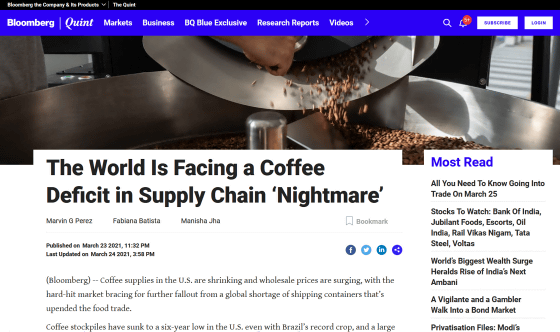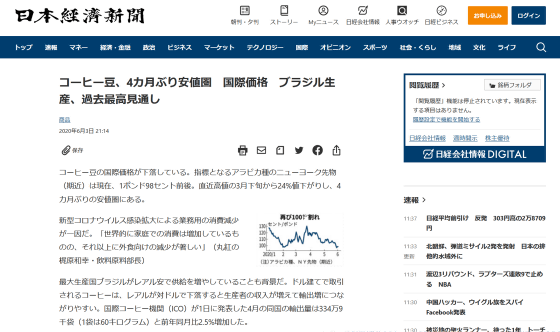Why is there a global shortage of coffee beans despite the 'highest production ever'?

Coffee is a popular drink all over the world, but Indian business and financial media
The World Is Facing a Coffee Deficit in Supply Chain'Nightmare'
https://www.bloombergquint.com/business/coffee-trade-reeling-from-virus-faces-nightmare-freight-snags

According to Bloomberg Quint, the stockpile of coffee beans is at the lowest level in six years in the United States, and wholesale prices are also rising. However, coffee bean production itself has not decreased. Despite the pandemic of the new coronavirus infection (COVID-19) that occurred in 2020, coffee bean production in Brazil is expected to reach a record high from 2020 to 2021, and coffee will be produced in June 2020. It was also reported that the international price of beans had fallen.
Coffee beans, lows for the first time in 4 months International price Brazil production, record high outlook: Nihon Keizai Shimbun
https://www.nikkei.com/article/DGXMZO59943470T00C20A6QM8000/

The reason why the stockpile is decreasing despite the increase in production is that the coffee beans produced cannot be transported due to the shortage of shipping containers worldwide. It seems that a large number of containers are stuck in ports in the United States and Europe and cannot be collected, and the coffee bean production area is not replenished with sufficient shipping containers.
Where did the container go during the global 'container shortage'? --GIGAZINE

It is said that the origin of the container shortage was the blockade of cities in each country due to the COVID-19 epidemic. In the first half of 2020, economic activity stopped due to the blockade of cities, and a large number of containers were left in ports such as the United States. After that, in response to the expansion of 'nesting demand' in the United States and Europe, a large number of containers loaded with goods were shipped to the United States from China and other countries, but at the important port, the luggage could be handled due to a shortage of workers and drivers. It is in a non-existent state.
Along with this, the freight rate of container ships has risen sharply since the latter half of 2020, and in February 2021, the freight rate has nearly tripled from the same period of the previous year. In addition, it is said that more than 90% of the containers used in the world are produced in China, but the current situation is that they are not able to respond to the rapid increase in demand.
Florida importer Christian Walser noted that shipping costs from South America to North America have more than doubled, 'everyone feels a pinch. These bottlenecks are container bottlenecks. It's become a nightmare. '
At the time of writing the article, it seems that coffee bean vendors can sell without raising the price significantly by cutting inventory, but the price of Arabica coffee futures in New York is 24% between the end of October 2020 and March 2021. It is said that it is rising. In addition, the inventory of green coffee beans in the United States in February 2021 decreased by 8.3% from the same month of the previous year, which is the lowest level since 2015. Analysts predict that lower inventories will run out of buffers when yields decline in Brazil, providing price support.

Financial firm Marex Spectron predicts that there will be a global coffee shortage between 2021 and 2022 as coffee bean production in Brazil is declining due to bad weather. Meanwhile, according to Luis Alberto Azebade Levi Jr., director of Dinamo, Brazil's largest coffee warehouse, there are a large number of beans waiting for empty containers to arrive in Brazil.
Marco Figuerade, who works for Ally Coffee, a coffee importer based in Florida, said, 'I'm worried about logistics, such as lack of space and containers. We monitor the situation and talk to our customers. And they are aware of the rising costs. '
In addition, Denmark's AP Moller Maersk , the world's largest shipping company, announced that it is temporarily unable to secure containers and charter vessels, causing delays in transportation. In addition to working to secure all available containers, he says he is repairing and reusing containers that are too old to be repaired. 'This is a temporary situation, both in terms of purchasing patterns and ship availability. We expect it to return to normal in the first half of 2021,' explained AP Moller Marks. ..

At the time of writing, many coffee bean retailers and cafes have put up with price increases to regain the customers lost in the pandemic. However, it may take years for the food service industry to return to pre-pandemic levels, eventually forcing coffee prices to rise.
Related Posts:
in Junk Food, Posted by log1h_ik







